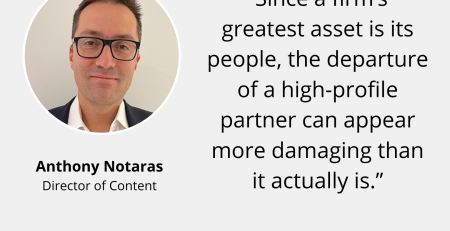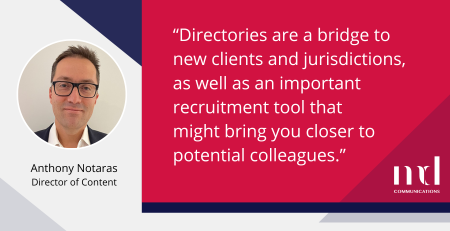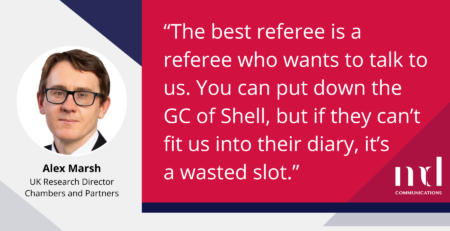Hot on the heels of the announcement that The Legal 500 submission process is moving to a ‘wholly digital platform’, I joined a group of industry representatives yesterday, invited to meet with The Legal 500 publishing director David Burgess and UK editor Alex Boyes to hear more about the plans and discuss the proposed developments. So, what’s happening and what does it mean for firms?
What are the changes?
The submission process. To date, Legal 500 submissions and referee spreadsheets have been submitted via email, with a slightly pernickety naming convention. Hours have been spent and many a late night working on draft after draft to create ‘The Final Submission’.
Particularly for firms with multiple submissions, the rigmarole that followed, attaching the right documents to the various emails with the correct titles and making sure they were emailed before the deadline was a ‘short straw’ task.
The most immediate change will be to the submission process. Going forward, submissions can be uploaded throughout the year, saved as a working draft until the submission deadline. To ensure version control, only one person will be able to work on a live draft at one time. However, firms will be able to work on separate practice area submissions at the same time.
It should be noted that the changes are currently only aimed at law firms. A rollout for barristers will commence in phase two.
What does this mean for the current round?
The Legal 500 has clarified that for the UK guide, firms can submit in the following ways:
- by downloading and using a new Word template, filling it in offline and sending it to editorial@legal500.com (new template is available here – underneath the login box), or
- by using a new online form to fill in and submit (currently in beta phase – if you haven’t already been sent login details to the new platform by The Legal 500, you can take part by emailing submissions@legal500.com), or
- by sending your submissions in your own template as usual to editorial@legal500.com (The Legal 500 is encouraging firms to use the new form where possible but appreciates that some firms will have already started putting together their submissions using their own templates/forms)
Update: Alex Boyes, UK editor of The Legal 500, has published a really useful Q&A about the submission process for 2018.
As a further development, the hard copy Legal 500 tomes will be no more – so last year’s can be now viewed as an antique. This came from feedback mainly from GCs which The Legal 500 has taken on board. Everything will now be digital.
Improved access to current information
The longer term plans include enhancing and expanding information about firms and sets available on The Legal 500 platform.
In October, we published our white paper ‘Legal Directories: are they still relevant?‘. Our research base for the paper included over 220 lawyers and GCs. Feedback in particular from GCs gave rise to the chapter ‘What’s Lacking?’.
GCs told us that the role of the directories is limited to their current use – identifying or validating respected firms, practices and individuals. Corporate counsel, the stated prime target readership for the directories, reported that the directories do not reflect the balance of criteria that they must consider when selecting external counsel.
This includes price, service models, fee options, the quality of offshore/northshore/nearshore legal service offices and use of new technologies. All factors which can receive passing mention in client comments, but despite their importance in selecting legal advisers, do not feature in the key information presented by the directories.
Further, GCs commented strongly that the current search functions are mostly unable to deal with the sector-based view taken by corporate counsel, mirroring the structure of law firms rather than the way clients review their legal requirements. In short, search functions are currently seen as ‘law firm centric’.
We asked David Burgess about the involvement of GCs in the proposed changes. As the end users, they have been consulted heavily in creating a platform that works for all. A redesigned and more accessible new website is in development, the move to the digital platform for uploading research data is being made as part of this wider development process.
Collaboration
Throughout the discussions with David and Alex, what was very clear is The Legal 500’s commitment to working collaboratively with law firms. David and his team absolutely recognise the significant amount of time and resource that firms pour into their submissions.
They want to create a platform that works for firms and sets, as well as buyers of legal services, enabling lawyers and advocates to provide the most relevant and current information about all aspects of their practice and client service.
Straight from the horse’s mouth, David commented:
“The Legal 500 is always seeking feedback on the rankings and any of its products. Editors, researchers and BD staff are constantly meeting with firms, sets and clients all over the UK, and globally, to ensure that we do not develop our products in isolation. We really value collaboration and our relationships to ensure that The Legal 500 is a pleasure to work with, and provides what our users need.”
There are more changes coming up which are not yet public but as a team we are sure that firms will be delighted with a more streamlined process to complete and upload submissions.
If you have any queries or if you would benefit from our help in completing your Legal 500 submissions, please get in touch.
Request a copy of our white paper
Please email directories@mdc.accura-tech.com to obtain a copy of our white paper Legal Directories: Are they still relevant?












